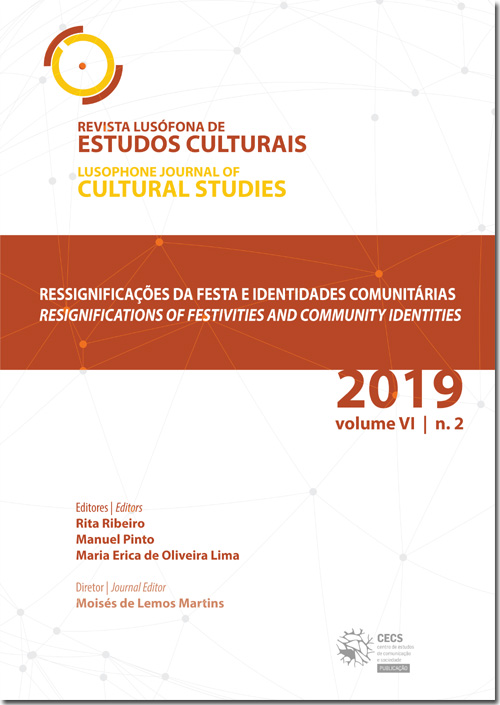The production of meaning in the dialectic of historical reconstruction of “Congado” in Uberlândia
DOI:
https://doi.org/10.21814/rlec.2112Keywords:
Congado, daily life, Cultural Studies, dialectic, communicationAbstract
Is it possible that the production of meaning of “Congado”, in the daily life of the city of Uberlândia, can be ratified by the historical reconstruction of the past struggle for black identity, without the risk of depoliticization of the subjects by the beauty of the folkloric representation or by being a tourist attraction? This is the problem analyzed in this article, which aims at historically examining the production of meaning of “Congado” in the city of Uberlândia, MG, Brazil. The death of ancient personalities and the need for renewal have created a disruption between the present and the past. It is as if the threads of tradition were being broken. These questions lead us to undertake cultural analysis, through Cultural Studies, in which historicity, dialectic and the subjects in movement constitute primordial factors, to understand the history of Congado amid the dialectical complexity of its historical course.
Downloads
References
Benjamin, W. (1984). Reflexões: a criança, o brinquedo, a educação. São Paulo: Summus.
Benjamin, W. (1986). Documentos de cultura, documentos de barbárie: escritos escolhidos. São Paulo: Cultrix.
Bosi, A. (1992). Dialética da colonização. São Paulo: Cia das Letras.
Brasileiro, J. (2012). O ressoar dos tambores do Congado – entre a tradição e a contemporaneidade: cotidiano, memórias, disputas (1955-2011). Dissertação de Mestrado em História, Universidade Federal de Uberlândia, Uberlândia.
Brasileiro, J. (2019). O Congado (a) e a permanência do racismo na cidade de Uberlândia- MG: resistência negra, identidades, memórias, vivências (1978-2018). Tese de Doutorado em História, Universidade Federal de Uberlândia, Uberlândia.
Carvalho, E. F. (2008). O rosário de Aninha[manuscrito]: os sentidos dadevoção rosarina na escritura de Anna Joaquina Marques.Goiás: E. F. Carvalho.
Certeau, M. de (1995). A cultura no plural. Campinas (SP): Papirus.
Certeau, M. de (1994). A invenção do cotidiano: artes de fazer. Petrópolis (RJ): Vozes.
Gabarra, L. O. (2003). Congado: a festa do batuque. Caderno Virtual de Turismo, 3(2). Retirado de http://www.ivt.coppe.ufrj.br/caderno/index.php/caderno/article/view/32/30
Halbwachs, M. (1968). A memória coletiva. São Paulo: Ed. Vértice.
Hall, S. (1997). A centralidade da cultura: notas sobre as revoluções culturais do nosso tempo. Educação & Realidade, 22(2), 15-46.
Hall, S. (2003). Da diáspora: identidades e mediações culturais. Belo Horizonte: Editora UFMG.
Lopes, V. M. Q. C. (2007). Uberlândia: racionalidade urbana, religiosidade e tradições culturais. In M. C. Abdala & M. C. T. Machado (Eds.), Caleidoscópio de saberes e práticas populares, catálogo da produção cultural do Triângulo Mineiro e Alto Paranaíba (pp. 76-77). Uberlândia: EDUFU.
Munanga, K. & Gomes, N. L. (2004). Para entender o negro no Brasil de hoje: história, realidades, problemas e caminhos. São Paulo: Global; Ação Educativa.
Pollak, M. (1989). Memória, esquecimento e silêncio. Estudos Históricos, 2(3), 3-15.
Pollak, M. (1992). Memória e identidade social. Estudos Históricos, 5(10), 200-215.
Sousa Santos, B. (1999, abril). Os novos caminhos da teoria crítica. Conferência de encerramento do colóquio comemorativo dos 20 anos da Revista Crítica de Ciências Sociais: Sociedade, Cultura e Política no Fim do Século; a Reinvenção da Teoria Crítica. Coimbra.
Sousa, G. (2014). Memórias do cinema em Uberlândia pela análise da comunicação e cultura. Uberlândia: Universidade Federal de Uberlândia.
Teixeira, T. (1970). Bandeirantes e pioneiros do Brasil central: história da criação do município de Uberlândia. Uberlândia: Uberlândia Gráfica LTDA.
Downloads
Published
How to Cite
Issue
Section
License
Authors own the copyright, providing the journal with the right of first publication. The work is licensed under a Creative Commons - Atribuição 4.0 Internacional License.








